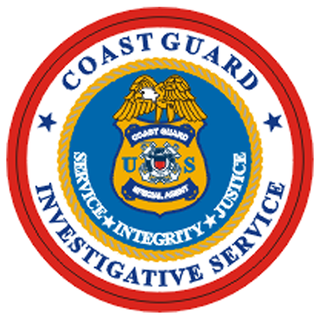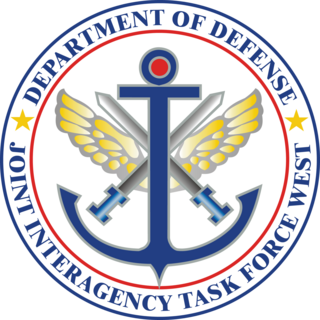Related Research Articles

The Australian Federal Police (AFP) is the national and principal federal law enforcement agency of the Australian Government with the unique role of investigating crime and protecting the national security of the Commonwealth of Australia. The AFP is an independent agency of the Attorney-General's Department and is responsible to the Attorney-General and accountable to the Parliament of Australia. As of October 2019 the Commissioner of the Australian Federal Police is Reece Kershaw, formerly the Northern Territory Police Commissioner.
The Serious Organised Crime Agency (SOCA) was a non-departmental public body of the Government of the United Kingdom which existed from 1 April 2006 until 7 October 2013. SOCA was a national law enforcement agency with Home Office sponsorship, established as a body corporate under Section 1 of the Serious Organised Crime and Police Act 2005. It operated within the United Kingdom and collaborated with many foreign law enforcement and intelligence agencies.

The European Union Agency for Law Enforcement Cooperation, better known under the name Europol, formerly the European Police Office and Europol Drugs Unit, is the law enforcement agency of the European Union (EU) formed in 1998 to handle criminal intelligence and combat serious international organised crime and terrorism through cooperation between competent authorities of EU member states. The Agency has no executive powers, and its officials are not entitled to arrest suspects or act without prior approval from competent authorities in the member states. Seated in The Hague, it had 1,432 staff members in 2022.

The United States Naval Criminal Investigative Service (NCIS) is the primary law enforcement agency of the U.S. Department of the Navy. Its primary function is to investigate criminal activities involving the Navy and Marine Corps, though its broad mandate includes national security, counterintelligence, counterterrorism, cyberwarfare, and the protection of U.S. naval assets worldwide. NCIS is the successor organization to the former Naval Investigative Service (NIS), which was established by the Office of Naval Intelligence after the Second World War.

Law enforcement in France has a long history dating back to AD 570 when night watch systems were commonplace. Policing is centralized at the national level. Recently, legislation has allowed local governments to hire their own police officers which are called the "police municipale".
The National Criminal Intelligence Service (NCIS) was a United Kingdom policing agency. Following the Police and Criminal Justice Act 2001, NCIS returned to direct funding by the Home Office in 2002 and was a non-departmental public body. On 1 April 2006 it was merged into the newly created Serious Organised Crime Agency.

The Coast Guard Investigative Service (CGIS) is a division of the United States Coast Guard that investigates crimes where the U.S. Coast Guard has an interest. It is composed of civilian (GS-1811), active duty, reserve enlisted, and warrant officer special agents.

The Halifax Regional Police (HRP) is one of a number of law enforcement agencies operating in the Halifax, Nova Scotia; the other primaries being the Royal Canadian Mounted Police and the Canadian Forces Military Police. The city also is home to a small detachment of the Canadian National Railway Police.

The Federal Criminal Police Office of Germany is the federal investigative police agency of Germany, directly subordinated to the Federal Ministry of the Interior. It is headquartered in Wiesbaden, Hesse, and maintains major branch offices in Berlin and Meckenheim near Bonn. It has been headed by Holger Münch since December 2014.

Law enforcement in Germany is constitutionally vested solely with the states, which is one of the main features of the German political system.

The Organized Crime Drug Enforcement Task Force (OCDETF) is a federal drug enforcement program in the United States, overseen by the Attorney General and the Department of Justice. The principal mission of the OCDETF program is to identify, disrupt, and dismantle the major drug trafficking operations and tackle related crimes, such as money laundering, tax and weapon violations, and violent crime, and prosecute those primarily responsible for the nation's drug supply.

Transnational organized crime (TOC) is organized crime coordinated across national borders, involving groups or markets of individuals working in more than one country to plan and execute illegal business ventures. In order to achieve their goals, these criminal groups use systematic violence and corruption. Common transnational organized crimes include conveying drugs, conveying arms, trafficking for sex, toxic waste disposal, materials theft and poaching.

The National Bureau of Investigation (NBI) is a national law enforcement agency of the Finnish Police and the principal criminal investigation and criminal intelligence organization of Finland. The Bureau's main tasks are to counter and investigate organized crime, provide expert services, and develop methods for criminal investigation. NBI is also responsible for financial intelligence (FININT), such as preventing money laundering and terrorism financing. NBI headquarters has been situated in the city of Vantaa within the Capital Region since 1994 with field offices in Tampere, Turku, Mariehamn, Joensuu, Oulu and Rovaniemi. It is subordinate to the National Police Board under the jurisdiction of the Interior Ministry.

The Federal Police, formerly known as the Policía Federal Preventiva and sometimes referred to in the U.S. as "Federales", was a Mexican national police force formed in 1999 and folded into the National Guard in 2019. It operated under the authority of the Department of Security and Civil Protection.
Law enforcement in Azerbaijan comes under the control of the Ministry of Internal Affairs of Azerbaijan, which administers the National Police of the Republic of Azerbaijan. Admitted to the Organization for Security and Co-operation in Europe (OSCE) on 30 January 1992, with an OSCE office opening in Baku on 16 November 1999, and as a member of INTERPOL, the National police force is well integrated into the law enforcement network of European countries.

The Narcotics Control Bureau is an Indian central law enforcement and intelligence agency under the Ministry of Home Affairs, Government of India. The agency is tasked with combating drug trafficking and the use of illegal substances under the provisions of Narcotic Drugs and Psychotropic Substances Act.

Sir Robert Mark Wainwright KCMG is a British civil servant. He was the director of Europol from 16 April 2009 until 1 May 2018.

The National Crime Agency (NCA) is a national law enforcement agency in the United Kingdom. It is the UK's lead agency against organised crime; human, weapon and drug trafficking; cybercrime; and economic crime that goes across regional and international borders; but it can be tasked to investigate any crime. The NCA has a strategic role as part of which it looks at serious crime in aggregate across the UK, especially analysing how organised criminals are operating and how they can be disrupted. To do this, it works closely with regional organised crime units (ROCUs), local police forces, and other government departments and agencies.

Joint Interagency Task Force West is a standing United States military joint task force with the mission of combating drug-related transnational organized crime in the Indo-Asia-Pacific. JIATF West's area of responsibility (AOR) is that of United States Indo-Pacific Command (USINDOPACOM). JIATF West is one of two Joint Interagency Task Forces with a counter-narcotics mission. The other is Joint Interagency Task Force South. The task force is run as USPACOM's "executive agent" for counterdrug activities providing support to partner nation law enforcement. Approximately 100 active duty and reserve U.S. military forces; Department of Defense civilian employees; contractors; and U.S. and foreign law enforcement agency personnel are members of the task force.

Operation Community Shield is an ongoing multi-agency law enforcement initiative targeting violent gang members and their associates involved in the illegal drug and human trafficking industries in the United States. Since its launch by U.S. Immigration and Customs Enforcement (ICE) in February 2005, Homeland Security Investigations (HSI) and other participating federal, state and local law enforcement agencies have made more than 40,000 gang-related arrests, including 451 gang leaders, representing more than 2,400 different gangs and organizations, and have seized more than 8,000 guns in multiple projects.
References
- ↑ Police999.com Retrieved 2011-10-19
- ↑ A Leong - The Disruption of International Organised Crime: An Analysis of Legal and Non-Legal Strategies Ashgate Publishing, Ltd., 2007 Retrieved 2012-07-10 ISBN 075467066X
- ↑ N Fielding - The Police And Social Conflict Routledge, 20 Dec 2005 Retrieved 2012-07-10 ISBN 1904385230
- ↑ N Dorn, K Murji, N South - Traffickers: Drug Markets and Law Enforcement Psychology Press, 1992 Retrieved 2012-07-10
- ↑ Shanty,F - Organized crime: from trafficking to terrorism, Volume 2 Retrieved 2011-10-19
- ↑ The Independent newspaper - 25 August 1992 Retrieved 2011-10-19